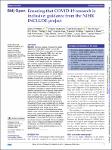Ensuring that COVID-19 Research is Inclusive - guidance from the NIHR INCLUDE project
| dc.contributor.author | Witham, MD | |
| dc.contributor.author | Anderson, E | |
| dc.contributor.author | Carroll, Camille | |
| dc.contributor.author | Dark, PM | |
| dc.contributor.author | Down, K | |
| dc.contributor.author | Hall, AS | |
| dc.contributor.author | Knee, J | |
| dc.contributor.author | Maher, ER | |
| dc.contributor.author | Maier, RH | |
| dc.contributor.author | Mountain, GA | |
| dc.contributor.author | Nestor, G | |
| dc.contributor.author | O’Brien, JT | |
| dc.contributor.author | Oliva, L | |
| dc.contributor.author | Wason, J | |
| dc.contributor.author | Rochester, L | |
| dc.date.accessioned | 2020-10-20T16:16:01Z | |
| dc.date.issued | 2020-11 | |
| dc.identifier.issn | 2044-6055 | |
| dc.identifier.issn | 2044-6055 | |
| dc.identifier.other | ARTN e043634 | |
| dc.identifier.uri | http://hdl.handle.net/10026.1/16571 | |
| dc.description | File replaced (docx to pdf) on 28.4.23 by NK (LDS) | |
| dc.description.abstract |
<jats:sec><jats:title>Objective</jats:title><jats:p>To provide guidance to researchers, funders, regulators and study delivery teams to ensure that research on COVID-19 is inclusive, particularly of groups disproportionately affected by COVID-19 and who may have been historically under-served by research.</jats:p></jats:sec><jats:sec><jats:title>Summary of key points</jats:title><jats:p>Groups who are disproportionately affected by COVID-19 include (but are not limited to) older people, people with multiple long-term conditions, people with disabilities, people from Black, Asian and Ethnic minority groups, people living with obesity, people who are socioeconomically deprived and people living in care homes. All these groups are under-served by clinical research, and there is an urgent need to rectify this if COVID-19 research is to deliver relevant evidence for these groups who are most in need. We provide a framework and checklists for addressing key issues when designing and delivering inclusive COVID-19 research, based on the National Institute for Health Research INnovations in CLinical trial design and delivery for the UnDEr-served project roadmap. Strong community engagement, codevelopment and prioritisation of research questions and interventions are essential. Under-served groups should be represented on funding panels and ethics committees, who should insist on the removal of barriers to participation. Exclusion criteria should be kept to a minimum; intervention delivery and outcome measurement should be simple, flexible and tailored to the needs of different groups, and local advice on the best way to reach and engage with under-served communities should be taken by study delivery teams. Data on characteristics that allow identification of under-served groups must be collected, analyses should include these data to enable subgroup comparisons and results should be shared with under-served groups at an early stage.</jats:p></jats:sec><jats:sec><jats:title>Conclusion</jats:title><jats:p>Inclusive COVID-19 research is a necessity, not a luxury, if research is to benefit all the communities it seeks to serve. It requires close engagement with under-served groups and attention to aspects of study topic, design, delivery, analysis and dissemination across the research life cycle.</jats:p></jats:sec> | |
| dc.format.extent | e043634-e043634 | |
| dc.format.medium | Electronic | |
| dc.language | en | |
| dc.language.iso | en | |
| dc.publisher | BMJ Publishing Group | |
| dc.subject | COVID-19 | |
| dc.subject | statistics & | |
| dc.subject | research methods | |
| dc.subject | public health | |
| dc.title | Ensuring that COVID-19 Research is Inclusive - guidance from the NIHR INCLUDE project | |
| dc.type | journal-article | |
| dc.type | Journal Article | |
| dc.type | Research Support, Non-U.S. Gov't | |
| dc.type | Review | |
| plymouth.author-url | https://www.webofscience.com/api/gateway?GWVersion=2&SrcApp=PARTNER_APP&SrcAuth=LinksAMR&KeyUT=WOS:000591838700013&DestLinkType=FullRecord&DestApp=ALL_WOS&UsrCustomerID=11bb513d99f797142bcfeffcc58ea008 | |
| plymouth.issue | 11 | |
| plymouth.volume | 10 | |
| plymouth.publication-status | Published | |
| plymouth.journal | BMJ Open | |
| dc.identifier.doi | 10.1136/bmjopen-2020-043634 | |
| plymouth.organisational-group | /Plymouth | |
| plymouth.organisational-group | /Plymouth/Faculty of Health | |
| plymouth.organisational-group | /Plymouth/Faculty of Health/Peninsula Medical School | |
| plymouth.organisational-group | /Plymouth/REF 2021 Researchers by UoA | |
| plymouth.organisational-group | /Plymouth/REF 2021 Researchers by UoA/UoA03 Allied Health Professions, Dentistry, Nursing and Pharmacy | |
| plymouth.organisational-group | /Plymouth/Research Groups | |
| plymouth.organisational-group | /Plymouth/Research Groups/FoH - Applied Parkinson's Research | |
| plymouth.organisational-group | /Plymouth/Research Groups/FoH - Community and Primary Care | |
| plymouth.organisational-group | /Plymouth/Research Groups/Institute of Translational and Stratified Medicine (ITSMED) | |
| plymouth.organisational-group | /Plymouth/Research Groups/Institute of Translational and Stratified Medicine (ITSMED)/CCT&PS | |
| plymouth.organisational-group | /Plymouth/Research Groups/Plymouth Institute of Health and Care Research (PIHR) | |
| plymouth.organisational-group | /Plymouth/Users by role | |
| plymouth.organisational-group | /Plymouth/Users by role/Academics | |
| dc.publisher.place | England | |
| dcterms.dateAccepted | 2020-10-20 | |
| dc.rights.embargodate | 2020-11-17 | |
| dc.identifier.eissn | 2044-6055 | |
| dc.rights.embargoperiod | Not known | |
| rioxxterms.versionofrecord | 10.1136/bmjopen-2020-043634 | |
| rioxxterms.licenseref.uri | http://www.rioxx.net/licenses/all-rights-reserved | |
| rioxxterms.licenseref.startdate | 2020-11 | |
| rioxxterms.type | Journal Article/Review |


